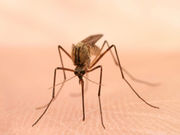Findings suggest older medication is losing effectiveness, researchers say
THURSDAY, March 10, 2016 (HealthDay News) — A combination drug therapy widely used to treat malaria in adults — dihydroartemisinin-piperaquine (DP) — also protects pregnant women and their fetuses from the disease, according to research published in the March 10 issue of the New England Journal of Medicine.
The study included 300 pregnant women in Uganda. Beginning in the 16th week of pregnancy, about one-third of the women received three doses of sulfadoxine-pyrimethamine (SP), one-third received three doses of DP, and one-third received monthly doses of DP.
Evidence of malaria infection was found in half the women who were given SP (50 percent), compared with 34.1 percent who had three doses of DP, and 27.1 percent who had monthly doses of DP. Of the women who received SP, 40.5 percent had malaria parasites in their blood, compared with 16.6 percent of those in the three-dose DP group and 5.2 percent in the monthly DP group. None of the women in the monthly DP group developed malaria, compared with 41 of the 106 in the SP group.
The study was not designed to test the effectiveness of SP, but the findings suggest the treatment is losing its effectiveness, the researchers said. “The malaria parasite’s resistance to SP is widespread, especially in sub-Saharan Africa. But we are still using the same drugs, because we have no better alternatives,” first author Abel Kakuru, M.D., said in a University of California, San Francisco, news release. Kakuru is an epidemiologist with the Infectious Diseases Research Collaboration in Kampala, Uganda.
Copyright © 2016 HealthDay. All rights reserved.








